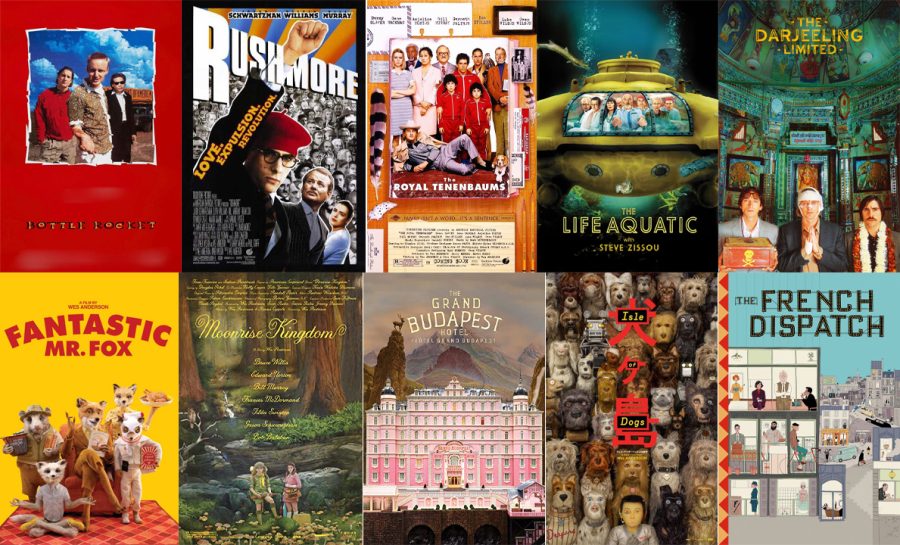The wonderful worlds of Wes Anderson ranked
The films of Wes Anderson are all diverse in their stories and style.
December 17, 2021
There are only a handful of filmmakers whose films are immediately recognizable—Quentin Tarantino for his unreal gore and snappy screenplays, David Lynch for his unnerving surrealism, etc.—but I don’t think there has been a better example of a modern auteur than Wes Anderson. In ten films over 25 years, Wes Anderson has cemented himself as one of the most unique voices in contemporary cinema, and it’s been a joy to see not only the fantastic stories he concocts but also how he continues to fine-tune his unique style. With the recent release of “The French Dispatch,” there’s no better time to do it, so here’s the films of Wes Anderson ranked.
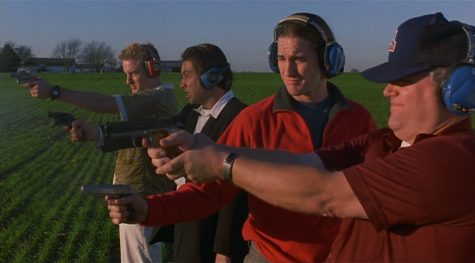
#10: Bottle Rocket (1996)
Overall rating: 72/100
Wes Anderson’s feature debut is obviously the most amateur of his films, but “Bottle Rocket” is still solid, and for a debut, it’s pretty incredible. The film follows Anthony (played by Luke Wilson in his debut role) who, after being released from a mental hospital after a nervous breakdown, meets up with Dignan (played by Owen Wilson, also in his debut role), who has devised a scattershot plan of crimes that will take them on the run. After stopping at a motel, Anthony quickly falls in love with Inez, a maid who barely speaks English. The most interesting thing about “Bottle Rocket” is that it’s a look at Anderson’s form in its infancy, which will really only be appealing to those who are fans of the man. It’s just a simple, messy film that compensates for its flaws with its big heart, and there really isn’t that much to it beyond that. Compared to the other films on this list, it’s the least stylish and emotionally compelling by a long shot, but the day that I watch a bad film from Wes Anderson is the day the world ends.
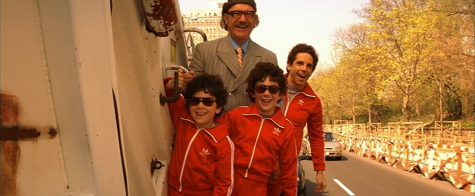
#9: The Royal Tenenbaums (2001)
Overall rating: 83/100
There aren’t many filmmakers that are as consistent as Wes Anderson, and every ranking of his films varies from person to person, which inevitably leads to some hot takes; this is likely one of them. This isn’t to say that “The Royal Tenenbaums” isn’t a great movie, because it most definitely is; it’s just a film that doesn’t resonate with me enough to warrant a higher placement on this list. The story of the Tenenbaum family—comprised of Gene Hackman, Anjelica Huston, Ben Stiller, Gwyneth Paltrow and Luke Wilson—and their dysfunctional relationship is one of Anderson’s best films on paper, but this is the only film of his that I think is too deadpan to fully achieve the immense emotional weight that it implies. Although, there are plenty of individual moments that are undeniably flooring—no spoilers, but the second that Elliott Smith’s “Needle in the Hay” starts playing will never fail to turn me into jello. Maybe I’ll turn around on this in the future, but as it stands right now, “The Royal Tenenbaums” is still a fine movie.
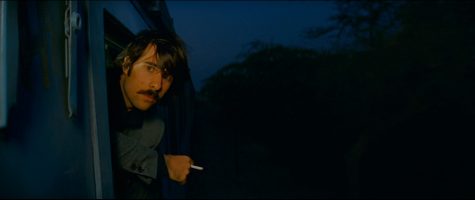
#8: The Darjeeling Limited (2007)
Overall rating: 85/100
I initially didn’t have that strong of a reaction to “The Darjeeling Limited,” but on a rewatch, there’s not a lot to say other than that it’s just a great movie. The central performances of Owen Wilson, Jason Schwartzman and Adrien Brody make a terrific trio, and the themes of brotherhood and family they exemplify are executed excellently. Filmed entirely on location in India and featuring a soundtrack of primarily film score from classic Indian films, the locales that the film journeys through provide for some of Anderson’s most striking compositions. How he navigates the camera through the cramped train that most of the film takes place on is delightful to watch, and it’s also worth mentioning that this is likely the best usage of slo-mo out of all of his films, with only “Moonrise Kingdom” coming anywhere close. As always, there’s a defining sadness to “The Darjeeling Limited” that’s realized in some of the most moving scenes out of any film on this list, but it also manages to deliver some darkly comic bits that play off of the more somber moments perfectly. I find it weird that so many people discard this as a weaker Wes Anderson film, because I think this is a great encapsulation of everything that he does well as a filmmaker.

#7: Isle of Dogs (2018)
Overall rating: 85/100
When I first saw “Isle of Dogs” in theaters, I was convinced that it was one of, if not the best Wes Anderson film—it was also the first Wes Anderson film I got to experience in such a setting. Of course, that novelty has worn off, but even despite many of the fair criticisms that have been made against it, you’ll come to see that I’m a massive sucker for Wes Anderson. The fact that I gave it this high of a rating and it’s this low in the ranking should say it all. Then again, it’s also hard not to love a film that’s as beautiful as this. Plain and simple, this is as stunning as stop motion animation gets—at least if Anderson doesn’t eventually make another stop motion film. Each ruffle of fur, facial expression and backdrop is perfectly realized, and it makes the dystopian world the film takes place in that much more inviting. Of course, the language barrier between the unsubtitled Japanese characters, whose lines we hear through translators and interpreters, does lead to some emotional disconnect, and the characters of Tracy (played by Greta Gerwig) and Nutmeg (played by Scarlet Johansson) are respectively lacking, but that’s really all I have to say negatively about “Isle of Dogs.” I can understand why some people place this lower in their rankings, but it’s hard for me not to have fun with it.
From here on out, this ranking gets tough, as all of the following movies are pretty much perfect in my eyes:
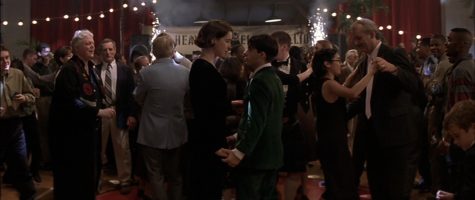
#6: Rushmore (1998)
Overall rating: 96/100
There’s this gross misconception that Wes Anderson’s detractors continually proclaim that his movies are too stylized in their visuals and stilted in their dialogue to have any emotional weight. This critique is mainly used in reference to his more recent and extravagant films, but I don’t think there’s a film that illustrates his capabilities as a writer more than “Rushmore.” Many of his films feature one specific moment or line that packs a punch and sums up the film’s melancholy, but the impact of “Rushmore” extends far beyond one scene or character. Each of the main characters—Jason Schwartzman’s Max Fischer, Bill Murray’s Herman Blume and Olivia Williams’ Rosemary Cross—are all laden with their own anxieties about love and grief, and they all could’ve been annoying or unlikable if it weren’t for how earnest Anderson’s delivery is. Despite their occasionally contemptible and immature behavior, their best qualities are always highlighted, and it allows me to see pieces of myself in all of them, and I think that that automatically makes it an amazing movie in my book.

#5: Moonrise Kingdom (2012)
Overall rating: 97/100
I was worried that my rewatch of “Moonrise Kingdom” would bring it further down in my ranking, but I unsurprisingly love it the same way I did when I first watched it in middle school. I’ve seen this film be called “cute” and “wholesome,” and while I can understand where those claims come from, I think there’s a lot of genuine honesty in what “Moonrise Kingdom” covers. As a story of young love, it’s easy to forget just how perfectly Wes Anderson’s style fits with it—the romance between Sam and Suzy (played by Jared Gilman and Kara Hayward in their terrific debut performances) is a whirlwind, and the film’s whimsicality provides an immersive, visual representation of it. It’d be easy to write their love off as naive, but it and everything else in “Moonrise Kingdom” is treated with the utmost sincerity. Watching the film again, I forgot that the adults of the story are equally as investing, with Frances McDormand, Bruce Willis and Bill Murray playing off of Sam and Suzy’s innocence with sobering infidelity and depression. For as weighty as its themes get, “Moonrise Kingdom” pulls off a buoyant tone, and the result is a movie that feels like a warm blanket.

#4: The Grand Budapest Hotel (2014)
Overall rating: 98/100
It’s not that surprising that “The Grand Budapest Hotel” is Wes Anderson’s most critically and commercially successful film to date. The massive ensemble cast featuring a superb turn from Ralph Fiennes, Anderson’s brimming and playful screenplay inspired by the writings of Stefan Zweig and what’s probably his most refined example of his dollhouse-like aesthetic are just the tip of the iceberg. Despite being one of his most exhaustively detailed films and its elaborate structure that zig-zags between four different timelines, it’s also his most effortless; it plays out on the screen with an incredible zeal, and save for the very small bridge between the second act and the climax, it never lags. Like almost every other title on this list, it’s an immediate contender for one of the best looking films, period—each image feels like something out of a pop-up book, and the pastel hues might be the most appealing color palette of any Wes Anderson film. If you need a starting point for Wes Anderson’s filmography, this is the best one I can think of.
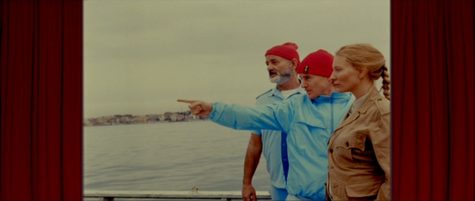
#3: The Life Aquatic with Steve Zissou (2004)
Overall rating: 98/100
If there was any film that could be considered the black sheep of Anderson’s canon, most would probably agree on it being “The Life Aquatic.” The only film by Wes Anderson to hold a negative score on Rotten Tomatoes, “The Life Aquatic” premiered to middling reviews and flopped at the box office, but it’s been reappraised and has developed a faithful cult following. Even still, this is a vastly underrated film in the context of Anderson’s career. Backed by a color palette that’s as deep and rich as the ocean it explores, an eclectic soundtrack composed of David Bowie songs in Portuguese and—it’s just a given at this point—a perfect ensemble led by Bill Murray, Owen Wilson and Cate Blanchett, it’s hard to think of a single thing that falters. This is Anderson’s longest film to date, and while the wonky pacing doesn’t necessarily help, it feels like such a trivial complaint to have with a film that’s so continuously enthralling. What sets “The Life Aquatic” apart from Anderson’s other films, though, is how it executes its melancholy. There isn’t another film on the list that’s as overwhelmingly sad as this one, and it culminates in probably my favorite scene out of his whole filmography—not many things truly move me to tears, but the line “I wonder if it remembers me” is just devastating. “The Life Aquatic” can be summed up in its final line: it’s truly an adventure.
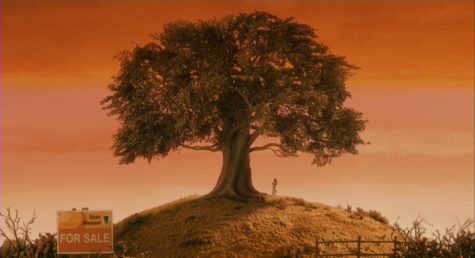
#2: Fantastic Mr. Fox (2009)
Overall rating: MASTERPIECE
2009 was possibly the year for animated films—“Up,” “Coraline,” “The Princess and the Frog,” I could go on—but there’s a very clear winner of the bunch in my mind, and that’s “Fantastic Mr. Fox.” Adapted from the Roald Dahl novel of the same name, Wes Anderson’s first foray into the realm of stop-motion animation is still the paragon of the medium. We follow the titular Mr. Fox (voiced by George Clooney), who has just moved out of a hole and into a tree near the facilities of the terrifying farmers Boggis, Bunce and Bean. Going back on the promise he made to his wife (voiced by Meryl Streep) after getting caught years earlier, he recruits an opossum named Kylie (voiced by Wallace Wolodarsky) to pull off three final heists, which leads to the farmers’ revenge that will change the lives of many animals. Many of Anderson’s best qualities are highlighted in “Fantastic Mr. Fox”—the honest, emotional monologues, the witty comedy and the precise visual style—but, like “The Grand Budapest Hotel,” there isn’t a need to dissect every little detail here, although you’re definitely welcome to do so. It’s just an effortlessly fun movie, and also one that’s perfect for the autumn season.
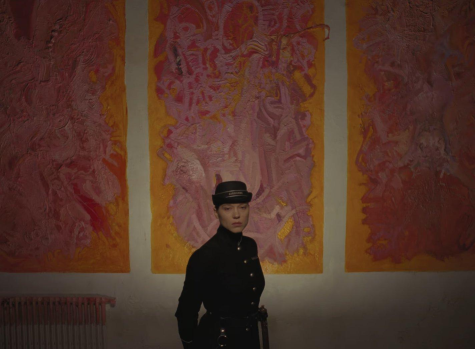
#1: The French Dispatch (2021)
Overall rating: MASTERPIECE
Call it recency bias or whatever, but I can’t imagine placing “The French Dispatch” in any other spot on this list. Everything that you’ve come to expect from Wes Anderson is here—the carefully composed designs, a massive cast of major actors and a fanciful score from Alexandre Desplat—but it’s all been turned up to eleven. Each frame of this film boasts so much painstaking detail, with almost every scene taking place on a new fantastical set; even after two viewings in a theater, I’m still nowhere close to grasping its immense scope. The three main storylines—“The Concrete Masterpiece,” an account of an imprisoned artist’s relationship with his muse and his rise to fame, “Revisions to a Manifesto,” the story of the youthful face of the Chessboard Revolution and “The Private Dining Room of the Police Commissioner,” a caper featuring a kidnapped child and a skilled police chef—are all captivating, but it’s how well they flow that makes it all the better. I think anything and everything that I have to say about this film can be summarized in two of its scenes: the moment when Jarvis Cocker’s rendition of “Aline” floods the speakers as Timothée Chalamet and Lyna Khoudri turn around and lean on a jukebox and the final scene, the first time all of the journalists are seen in the same room, faithfully abiding by the one rule enforced by Bill Murray’s Arthur Howitzer Jr.: no crying. I think the only word that can describe “The French Dispatch” is magical, and I just can’t wait to experience it again.
It’s hard to think of another filmmaker like Wes Anderson. His mere ten films and exceptional style are so singular that they’ve almost developed into their own genre of sorts, and it’s delightful to see that there’s still someone who’s continually pushing the boundaries of what they can do with film. Each time I watch a film by Wes Anderson, I’m reminded of why I love film in the first place, and it’s for that reason that he’s one of my favorite directors working today.
Average rating: 92/100


